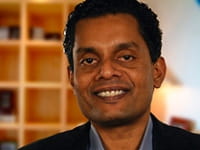An MD explains why he’s now pursuing his Ph.D. to further his international career.

Dr. Dhammika Perera.
PROGRAM: PhD in Public Health with a specialization in Community Health Education
WHAT I DO: I’m the senior advisor for reproductive health for the International Rescue Committee. I’m based in New York City, but I oversee the entire reproductive health spectrum in 24 countries.
WHY I WANT A PHD AFTER EARNING AN MD: I worked as an MD in clinical practice in Sri Lanka—that’s where I’m from—and thought, why not go where I’m really needed? Then I realized the problem was bigger than diagnosing and treating people; I found that health systems were broken in many of the countries where I worked. That motivated me. As an MD, I’m trained to focus on clinical cases, diagnoses, and solutions. My PhD in Public Health is teaching me to also consider social or socioeconomic dynamics like access to healthcare. This will make me a much better public health professional. Also, the way the field of medicine is moving, especially in the humanitarian and development fields, a doctoral degree is preferred. A PhD will allow me to advance my career.
WHY I CHOSE WALDEN: Online study is currently the only option for me because I have a very demanding job and travel extensively. I also like Walden’s focus on making a difference in societies. In the countries where I work, dramatic changes are needed in a relatively short time if lives are going to be saved.
HOW I MAKE TIME TO STUDY: I have two advantages: I have a great team of seven people to support my work, and, most of the time, I’m in places with a seven- or eight-hour time difference from the United States. That gives me the crucial three- or four-hour period to do my studies. I’m most productive in the mornings, so I wake up at 6:30 or 7 a.m. to study. If I’m in Nairobi, where I spend three or four months each year, I take a few hours to study until the New York office opens. I enjoy what I’m studying, so I don’t think of it as work.
WHAT I’VE LEARNED SO FAR: I’ve had a chance to look at what’s cutting edge in public health, such as social determinants of public health outcomes, mixed-method research, and automated disease surveillance. I’m also learning a lot about the U.S. and Canadian health systems and how public health differs in low- to high-income countries. Comparing these health systems gives me the perspective I need to look at the roles social structure, culture, and finances play in health.
WHAT I WANT TO RESEARCH: I’m considering a qualitative study that will look at the long-term contraceptive choices of African women. More and more, contraception is viewed as a crucial and cost-effective tool for maternal and reproductive health in general. Evidence shows that good birth spacing saves maternal lives as well as the lives of neonates and children under 5. I love what I’m learning. A doctorate enriches you in a way that changes you as a person. If you give it all you’ve got, the rewards are there.



